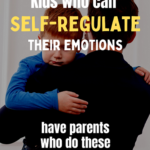Communicating with our children may be a challenging endeavor at times. We feel like they’re not listening to us; they feel like we’re not listening to them. Good listening and communicating skills are important to effective parenting. Your child’s thoughts, beliefs and opinions have value, and you should make sure you take the time to sit down and listen freely and address them honestly.
It appears to be a natural propensity to react rather than to respond. We pass judgment based on our own emotions and experiences. However, reacting implies being responsive to our child’s thoughts and emotions and enabling them to express themselves freely and honestly without fear of consequence from us. By responding, we offer our kid the message that their emotions and thoughts are worthless. But by reacting and asking questions about why the kid feels that way, it establishes a conversation that enables them to share their emotions further, and offers you a greater understanding of where they’re coming from. Responding also provides you a chance to figure out a solution or a plan of action with your kid that maybe they would not have came up with on their own. Your youngster will also appreciate the notion that maybe you do actually understand how they feel.
Read also: Fun and Educational: 10 Indoor Games to Keep Your Kids Busy
It’s vital in these moments to offer your kid your complete and undivided attention. Put down your newspaper, stop cleaning dishes, or turn off the television so you can hear the complete issue and establish eye contact with your youngster. Keep cool, be curious, and then suggest alternative solutions to the situation.
Don’t discourage your youngster from feeling sad, angry, or irritated. Our immediate inclination may be to speak or do anything to redirect our youngster away from it, but this may be a destructive technique. Again, listen to your kid, ask questions to find out why they are feeling that way, and then provide viable remedies to lessen the terrible sensation.
Just like we do, our children have emotions and endure unpleasant circumstances. By actively listening and interacting with our kid while they speak about it, it communicates to them that we do care, we want to assist and we have comparable experiences of our own that they can draw on. Remember, reply – don’t react.





